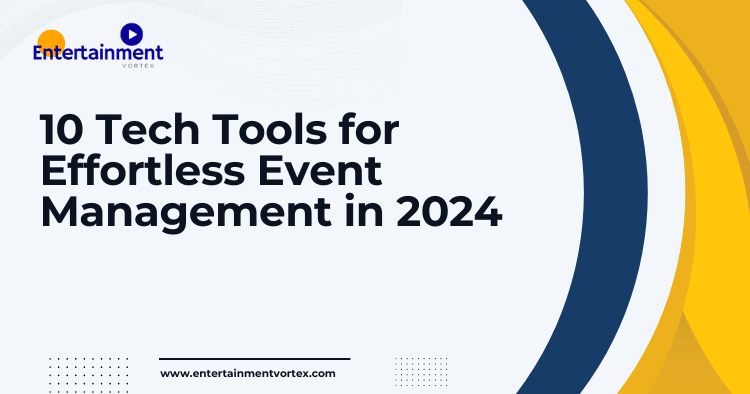Table of Contents
- Introduction
- 1. Event Management Software
- 2. Virtual Event Platforms
- 3. Ticketing Solutions
- 4. Social Media Management Tools
- 5. Email Marketing Services
- 6. Project Management Tools
- 7. Live Streaming Services
- 8. Event Feedback Tools
- 9. Networking Apps
- 10. Budgeting and Finance Tools
- Conclusion
- FAQs
Introduction
In today’s fast-paced world, technology is revolutionizing the way we manage events. From planning and marketing to execution and follow-up, tech tools streamline processes and enhance attendee experiences. In this article, we’ll explore ten essential tools that will make your event management efforts seamless and efficient in 2024. Let’s dive in!
1. Event Management Software
Event management software serves as the backbone of any successful event. These platforms allow you to handle registrations, manage schedules, and track attendees all in one place. Popular options like Eventbrite and Cvent offer robust features such as customizable event websites, attendee tracking, and data analytics.
| Feature | Eventbrite | Cvent |
|---|---|---|
| Custom Event Website | Yes | Yes |
| Ticketing | Yes | Yes |
| Analytics | Basic | Advanced |
| Attendee Management | Yes | Yes |
**Why It Matters:** By using event management software, you can save time and reduce stress, allowing you to focus on creating memorable experiences for your attendees.
2. Virtual Event Platforms
As hybrid events become the norm, investing in reliable virtual event platforms is crucial. Tools like Hopin and Zoom Events cater to online audiences, providing features such as breakout sessions, networking areas, and interactive polls.
Key Benefits:
- Increased reach to global audiences
- Enhanced engagement through interactive features
- Analytics to measure attendee participation
**Did You Know?** According to a report by EventMB, 80% of event planners believe that hybrid events will become standard by 2024.
3. Ticketing Solutions
Managing ticket sales can be a daunting task, but dedicated ticketing solutions simplify the process. Platforms like Ticketmaster and Eventbee offer seamless purchasing experiences, customizable ticket options, and real-time sales tracking.
Comparison of Ticketing Solutions
| Feature | Ticketmaster | Eventbee |
|---|---|---|
| Customizable Tickets | Yes | Yes |
| Real-time Analytics | Yes | Limited |
| Mobile Access | Yes | Yes |
**Pro Tip:** Always offer multiple ticket pricing tiers to cater to different budgets, enhancing accessibility for all potential attendees.
5. Email Marketing Services
Email marketing remains one of the most effective ways to reach your audience. Platforms like Mailchimp and Constant Contact offer tools for designing beautiful newsletters, segmenting your audience, and tracking engagement rates.
Why Use Email Marketing?
- Direct Communication: Reach your attendees where they are.
- Personalization: Tailor content to specific audience segments.
- Performance Tracking: Analyze open rates and clicks to optimize future campaigns.
Did You Know? According to HubSpot, personalized emails can increase transaction rates by up to 6 times!
6. Project Management Tools
Keeping track of all moving parts in event planning can be overwhelming. Tools like Trello and Asana help you manage tasks, set deadlines, and collaborate with your team efficiently.
Key Features
| Tool | Task Management | Collaboration | Reporting |
|---|---|---|---|
| Trello | Yes | Yes | Limited |
| Asana | Yes | Yes | Advanced |
Tip: Use project management tools to set timelines and assign responsibilities, ensuring everyone knows their roles.
7. Live Streaming Services
For hybrid and virtual events, live streaming is crucial. Services like Vimeo Livestream and YouTube Live allow you to broadcast your event to a broader audience, complete with features like multi-camera support and audience interaction.
Benefits of Live Streaming
- Wider Audience Reach: Engage attendees who can’t be there in person.
- Real-Time Interaction: Live Q&A sessions can boost engagement.
- Content Repurposing: Record streams for future marketing.
Reminder: Always test your setup before going live to prevent technical glitches.
8. Event Feedback Tools
Gathering feedback after your event is essential for improvement. Tools like SurveyMonkey and Google Forms allow you to create customized surveys to assess attendee satisfaction and gather insights for future events.
Why Feedback Matters
- Improve Future Events: Understand what worked and what didn’t.
- Engagement: Show attendees you value their opinions.
- Data-Driven Decisions: Use insights for strategic planning.
Tip: Offer incentives, such as discounts for future events, to encourage attendees to complete your surveys.
9. Networking Apps
Networking is a fundamental aspect of any event. Apps like Bizzabo and Whova enhance attendee interaction by providing features such as attendee profiles, messaging, and scheduling meetings.
Benefits of Networking Apps
- Facilitate Connections: Help attendees connect based on interests.
- Event Engagement: Encourage participation in discussions and activities.
- Follow-Up Opportunities: Enable easy follow-up after the event.
Fun Fact: Events that promote networking opportunities can increase attendee satisfaction by over 30%!
10. Budgeting and Finance Tools
Managing the budget is crucial for event success. Tools like QuickBooks and Expensify assist in tracking expenses, managing invoices, and ensuring you stay within budget.
Importance of Budgeting Tools
- Financial Oversight: Keep track of all expenditures in real-time.
- Expense Reports: Simplify the process of submitting and approving expenses.
- Forecasting: Plan for future events based on past spending.
Tip: Establish a clear budget before planning begins to set expectations and avoid overspending.
Conclusion
Incorporating the right technology into your event management strategy can significantly enhance efficiency and attendee satisfaction. By leveraging these ten tech tools in 2024, you can ensure your events run smoothly, allowing you to focus on what truly matters—creating memorable experiences for your guests. Also, consider exploring 10 Essential Tips for Craft Fairs Prep to further enhance your event planning skills.
FAQs
Q: What is the best event management software for small events?
A: For small events, tools like Eventbrite or Meetup are user-friendly and cost-effective.
Q: How can I improve attendee engagement during virtual events?
A: Use interactive features like polls, Q&A sessions, and breakout rooms to keep attendees engaged.
Q: What should I consider when choosing a ticketing platform?
A: Look for customization options, ease of use, and analytics features to track sales and attendee data.
Q: How can I ensure my event runs on budget?
A: Use budgeting tools and establish a clear budget before planning begins, and track expenses throughout the process.
By utilizing these tools and tips, you’re well on your way to mastering event management in 2024. Happy planning!







4. Social Media Management Tools
Promoting your event on social media is essential for maximizing attendance. Tools like Hootsuite and Buffer allow you to schedule posts, analyze engagement, and interact with attendees before, during, and after the event.
Benefits of Social Media Management Tools